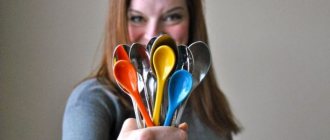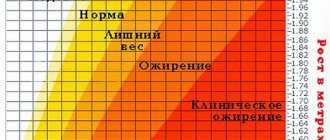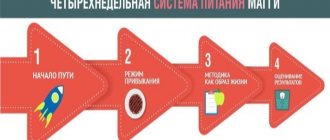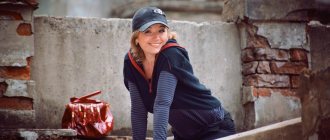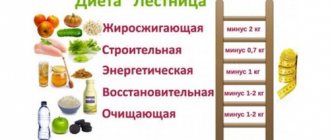Smooth transition
The diet is based on the principle of a gradual reduction in caloric intake to the level of basal metabolism. That is, the body receives from the outside exactly as much energy as it needs to maintain vital functions. At the start of the diet, a menu is drawn up for approximately 1800 kcal, and then the calorie content is gradually reduced to 1200 kcal. Thus, two goals are achieved:
- Metabolism does not slow down - the body does not starve, so there is no need to save energy.
- Weight decreases smoothly - any activity performed (even housework) with such a diet is already an excessive consumption of energy, for which the body is forced to spend fat reserves.
It is very important that at the initial stage to lose weight there is no need to specifically perform physical exercises. Many people who are obese find it difficult to do regular exercise. And here you can add training gradually, as you lose weight and improve your body’s condition. The diet is designed for a long term - at least 21 days.
Healthily lost weight
The reviews and results of those who completed this diet therapy course are super positive. The diet is well tolerated and there is practically no constant feeling of hunger. There is no feeling of sharp restrictions in the diet. Also, no subsequent special exit from the diet is required. This diet is gradually becoming a way of life. The weight gradually decreases and then stabilizes. General health improves noticeably.
The Institute of Nutrition of the Russian Academy of Medical Sciences has an official website where you can get more detailed information on diet, learn more about eating disorders, and even get an online consultation with a professional nutritionist. All attempts to outwit nature with various express diets and hunger strikes do not give long-term results. You can only count on success by collaborating with nature, and not by fighting against it.
Read with this
Verified rules
The basic rules governing the nutrition process are simple and they fully comply with the requirements of a healthy lifestyle:
- Eating 5-6 times a day in small portions.
- Adjusting the diet, eliminating fast food and high-calorie foods.
- Complete abstinence from alcohol at least for the duration of the diet.
- Sufficient amount of water - at least 1.5 liters per day.
- Limit salt intake to 5 grams per day.
- Maximum replacement of animal fats with vegetable ones.
- Milk and dairy products are consumed with a reduced percentage of fat content.
It is advisable to eat at the same hours or at equal time intervals. Eat slowly, chewing everything thoroughly. If you feel full and there is still food left on the plate, you do not need to finish the portion.
How to get to the Federal Nutrition Center Clinic under compulsory medical insurance
The clinical nutrition clinic of the Federal State Budgetary Institution “Federal Research Center for Nutrition and Biotechnology” is the only hospital in Russia where patients with obesity and overweight are treated with the help of specially developed therapeutic nutrition. Moreover, the clinic is open to receive specialized patients for planned hospitalization as part of compulsory health insurance (CHI).
It also accepts patients with diseases associated with obesity: type 2 diabetes mellitus, metabolic syndrome, hypertension, atherosclerosis, chronic heart failure.
Also, the clinic’s patients are people with gastric and duodenal ulcers, chronic gastritis, colitis and enteritis, hepatitis and pancreatitis, irritable bowel syndrome, as well as food allergies and intolerance to certain foods. In order to confirm the diagnosis or establish it, the clinic conducts a full laboratory and instrumental examination.
Comprehensive care is provided to adults and children in the following areas: dietetics, therapy, pediatrics, gastroenterology, cardiology, endocrinology, allergology, psychotherapy, neurology and a number of other specializations according to the clinic’s profile.
“According to data for 2021, 7,149 people (including 1,345 children) received inpatient care at the clinic, and 17,329 people received outpatient care. Repeatedly - 25-30% of patients, - said the scientific director of the Federal State Budgetary Institution "Federal Research Center for Nutrition and Biotechnology", Academician of the Russian Academy of Sciences, Doctor of Medical Sciences, Professor Viktor Aleksandrovich Tutelyan. – All patients receive nutritional advice. But they can consult with their doctor after discharge.”
Currently, hospitalization of patients at the clinic is possible:
- for compulsory medical insurance (compulsory health insurance) - strictly with a referral (057/u) from the clinic at the place of residence or upon the referral of a doctor for the selection of specialized departments of the clinic.
- According to VHI (voluntary medical insurance), with the provision of a letter of guarantee;
- on a paid basis, without referral documents (PMU).
So, what do you need to do to get to the clinic under compulsory medical insurance?
Step 1. Patient selection
In order for doctors to decide whether the clinic can help a particular patient, they first need to familiarize themselves with his documents.
Patients from Moscow and the Moscow region can provide documents both remotely and in person - through the advisory department of the Medical Nutrition Clinic or.
To get an appointment, you must pre-register by phone:
8,,, 8 (903) 120-11-11 for a consultation with a general practitioner or nutritionist.
And then collect and bring with you a package of documents:
- passport,
- compulsory medical insurance policy,
- SNILS
- direction (057/у) for consultation,
- a detailed extract from the outpatient card of the clinic at the place of residence.
During remote selection, it is enough for the patient to send copies of the following documents by email:
- passport (page with personal data and registration),
- compulsory medical insurance policy,
- SNILS,
- a detailed extract from the medical history indicating the main diagnosis and concomitant pathology, a description of the patient’s current condition (mild or moderate severity).
You must include your contact phone number in the letter so that the clinic staff can contact you.
If patients are in other regions of Russia, they can only be selected remotely. To do this, you need to send copies of the following documents [email protected]
- passport (page with personal data and registration),
- compulsory medical insurance policy,
- SNILS,
- a detailed extract from the medical history indicating the main diagnosis and concomitant pathology, a description of the patient’s current condition (mild or moderate severity).
Don't forget to include your contact phone number in the letter.
Step 2. Decision on hospitalization
All received documents are reviewed by a special medical commission, which also makes a decision on hospitalization - the meeting takes place twice a week (Tuesdays and Fridays at 10 am).
If the commission makes a positive decision on hospitalization of the patient, his documents are transferred to the specialized department to the selection consultant. He contacts the patient and, if necessary, requests additional information or medical documentation about his state of health, and agrees on the planned date of hospitalization. If you have a respiratory illness or are unable to come to the clinic on the appointed day, you must call 8-499-613-17-13 in advance or inform your selection consultant.
If there are no indications for hospitalization of the patient, by decision of the medical commission an official refusal is issued indicating the reasons and sent to the patient.
Step 3. Hospitalization
On the appointed day, the patient must come to the clinic. Hospitalization takes place from Monday to Friday from 9 to 11 (at other times by prior arrangement). Reception of patients is strictly according to the schedule at a specially established time for each.
When entering the clinic, the patient must have with him a package of documents:
- direction (057/у),
- a detailed extract from the outpatient card of the clinic at the place of residence,
- passport with registration, compulsory medical insurance policy, SNILS (3 copies of each document),
- laboratory tests: blood test for HIV, RW, HBsAg, anti-HCV (3 months),
- results of instrumental studies: fluorography or radiography of the chest organs (1 year),
- Breast ultrasound or mammography for women (1 year).
First, the patient enters the emergency department, where a nurse collects material (nasal and throat swabs for SARS-CoV-2 infection). After completing medical documentation and taking tests, the patient is admitted to the observation department and remains there for 24 hours until the results of the smears are received.
Who cannot be hospitalized:
- Patients who do not care for themselves and need additional care without a caregiver.
- Patients who test positive for SARS-CoV-2.
If medical or social reasons are identified that do not allow the patient to be hospitalized, he may be sent to another medical facility or offered other dates for planned hospitalization.
If the established FFOMS limits are exceeded, the patient is redirected to another medical institution or placed on a waiting list.
Strengthening the body
The diet is not designed for rapid weight loss; it is far from harmless, and you sometimes have to pay for the rapidly lost pounds with your own health. On this diet, in the first months, 3-5 kg of weight are lost, then from 2 to 4, depending on the initial build. But the lost kilos never come back!
In addition, healthy eating habits, the development of which is facilitated by the diet of the Institute of the Russian Academy of Medical Sciences, improve the general condition of the body:
- normalize the functioning of the digestive system;
- reduce the load on the liver and kidneys;
- reduce blood cholesterol levels;
- cleanse blood vessels, facilitate the work of the heart;
- increase immunity;
- cleanse the body of waste and toxins.
The diet has few restrictions that are easy to follow. There is no need to buy special products or prepare special dietary dishes. She is maximally adapted to a normal lifestyle.
Children's department
The pediatric department of dietetics, gastroenterology and hepatology has forty beds in comfortable three-bed rooms. In addition, there are single and double rooms of superior comfort - with toilet, shower and TV.
Hospitalization is carried out within the framework of high-tech medical care, research programs, compulsory medical insurance funds, as well as paid services from the Research Institute of Nutrition of the Russian Academy of Medical Sciences.
The children's department receives the most grateful reviews, since treatment occurs in accordance with clinical recommendations, with access to the most modern medications that are just appearing on the pharmaceutical market.
Individual dietary diets and seven-day menus are being developed, which include therapeutic and preventive dietary specialized products and dietary supplements.
Scientifically based menu
The diet of the Institute of Russian Academy of Medical Sciences does not offer a ready-made menu. Everyone makes up their own diet for the week, using the list of allowed foods, which is very extensive. Therefore, only those foods that are excluded from the diet will be listed here:
- fatty meat and fish;
- sugar and confectionery;
- white bread, pastries;
- starchy vegetables (potatoes, corn);
- sweet fruits (bananas, mangoes);
- butter, homemade cream;
- mayonnaise and flour sauces;
- sweet carbonated drinks, packaged juices.
When buying seasonings in bags, you need to pay attention to the salt and monosodium glutamate content in them. It is better to use fresh or dried herbs.
Sample menu for 1800 kcal:
- Breakfast: porridge with milk, a cup of cocoa.
- Second breakfast: 100 grams of low-fat cottage cheese, a glass of kefir.
- Lunch: soup with low-fat broth or lean borscht; 100 grams of meat or fish with a side dish of porridge or pasta; vegetable salad.
- Afternoon snack: fruit salad or smoothie.
- Dinner: 100 grams of fish with vegetable side dish, a glass of kefir.
Sample menu for 1200 kcal:
- Breakfast: 100 grams of low-fat cottage cheese; a glass of kefir.
- Second breakfast: fruit salad or freshly squeezed juice.
- Lunch: soup with low-fat broth or lean borscht; 100 grams of meat or fish; vegetable salad.
- Afternoon snack: 2 apples or a glass of yogurt with berries.
- Dinner: stewed vegetables, a glass of kefir.
Merits
The activities of the institute have always been successful: developments were introduced into health care practice, numbered diet systems were created (nosological principle), which were used everywhere until the beginning of the two thousandth, known as “Pevzner tables - from the first to the fifteenth.” Medical nutrition has become of great importance in hospitals and military hospitals, in public catering and in industrial enterprises.
With the help of the RAMS Institute of Nutrition, numerous scientific personnel and highly professional practitioners and specialists in this field were trained. M.I. Pevzner managed to get involved in the affairs of various medical societies, actively participated in the International Society of Gastroenterologists, chaired a section of the Moscow Therapeutic Society and taught at the Central Institute for Advanced Medical Studies (CIUV).




